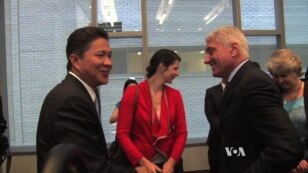10 July, 2014
51VOA听写整理,转载请注明出处。文本仅供参考,欢迎纠错!
From VOA Learning English, this is the Economics Report.
In June, Cambodian Commerce Minister Sun Chanthol spent a week in the United States. He visited the western cities of Los Angeles and Seattle before travelling to Washington D.C. During the trip, the Commerce Minister spoke about the willingness of his government to make "deep" reforms to improve conditions for investment.
He said the reforms would result in lower cost for investors. He said transportation and energy costs would be reduced. He also said the government would improve the skills of Cambodians through training.
Mr Sun Chanthol said the new political will to make reforms is the result of the general elections last year. In the voting, the ruling Cambodian People's Party lost a number of seats in parliament. The opposition Cambodian National Rescue Party disputed the results. It said cheating was to blame.

Cambodian Commerce Minister Sun Chanthol
Alex Feldman is president of the U.S.-ASEAN Business Council. He says that among investors, interest in Cambodia has grown over time. But he says investors need to see more evidence of reform.
"What the minister was talking about today was all very positive and all things that will attract business. We have seen progress. It's probably not been as much as the U.S. investors or the government would like. Hopefully, this time we make more progress. But we'll have to wait and see," said Feldman.
Alex Feldman says Cambodia should continue to improve roads, ports and other infrastructure. He says the country also has to improve the skill base of its citizens and fight corruption.
In 2013, Transparency International named Cambodia the most corrupt country in Southeast Asia.
Sun Chanthol says the Cambodian government has taken major steps toward reform, these include passing an anti-corruption law and creating an agency to fight corruption.
Storm Tiv works for the Asia division at Human Rights Watch. He admits that anti-corruption efforts have increased in Cambodia. But he says the lack of openness about the process will make them ineffective.
"The lack of the ability to publicly disclose the assets of ministers keeps corruption as an issue. And so unless assets are publicly disclosed, corruption is still going to be an issue. The existence of an anti-corruption unit, then, doesn't seem to show any real difference in how Cambodia addresses corruption," said Tiv.
Those who took part in the Washington meeting with the Commerce Minister said they were hopeful about Cambodia's reform plans. However, they said it was too soon to know if they would result in changes.
And that's the Economics Report in VOA Learning English. It was based on a report by Sophat Soeung. I'm Mario Ritter.